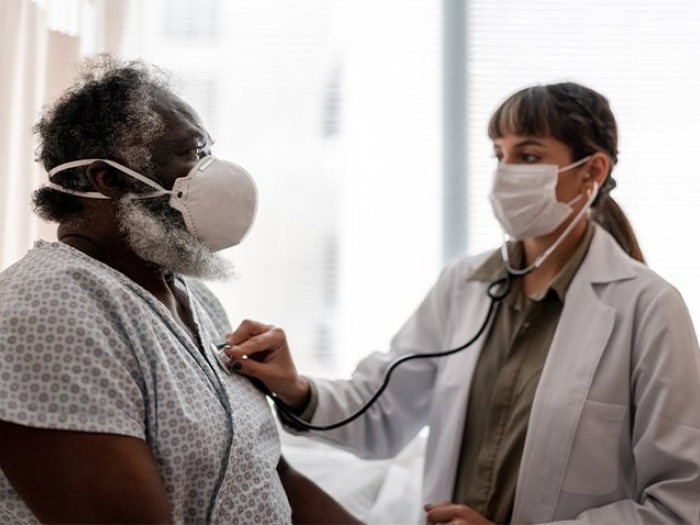Researchers suggest measuring oxygen saturation directly from the blood to guide treatment
5:00 AM
Author |

Racially biased readings of oxygen levels in the blood using pulse oximeters may further limit opportunities for Black patients with heart failure to receive potentially lifesaving treatments, such as heart pumps and transplants, a Michigan Medicine study finds.
“This is especially important because we know that Black patients are already less likely to receive heart pumps or transplants compared to their white counterparts, and these inaccurate readings can further widen a disparity that must be addressed by our health care system,” said first author Scott W. Ketcham, M.D., a third year fellow in cardiovascular medicine at University of Michigan Health.
During the COVID-19 pandemic, U-M researchers uncovered that pulse oximeters — devices placed on the finger to detect blood oxygen levels rather than directly from the blood — may not provide accurate readings for Black patients.
Heart failure providers use pulse oximeter readings to guide medication management decisions, as well as to determine whether patients are candidates for heart transplants or left ventricular assist devices, known as LVADs, which assist the heart in pumping.
These inaccurate readings can further widen a disparity that must be addressed by our health care system.”Scott W. Ketcham, M.D.
In a review of adult heart failure patients treated in U-M Health’s medical and surgical cardiac ICUs between 2016 and late 2022, researchers found that pulse oximeter readings underestimated how much blood was pumping out of a patient’s heart and overestimated the resistance in the blood vessels.
The results are published in Circulation: Cardiovascular Quality and Outcomes.
“In addition to possibly precluding Black patients from being candidates for LVADs or heart transplants, these inaccurate measurements could result in the unnecessary use of medications that affect heart and vessel function,” said co-author Matthew C. Konerman, M.D., a heart failure cardiologist at the U-M Health Frankel Cardiovascular Center.
On Feb. 2, 2024, the United States Food and Drug Administration held a public advisory committee meeting to discuss approaches to improve methods used to evaluate the performance of pulse oximeters with respect to skin pigmentation, race and ethnicity.
As changes are evaluated and considered, the research team says, the results should prompt heart failure providers to rethink their management strategies.
“For our Black patients with heart failure, we need to either measure oxygen saturation directly from the blood or use other methods to measure hemodynamics if we are using them to guide treatment of these patients,” said senior author Sarah K. Adie, PharmD, B.C.C.P., a clinical pharmacy specialist in cardiology at U-M Health and adjunct clinical assistant professor in the U-M College of Pharmacy.
SEE ALSO: Pulse oximeters missed low oxygen levels in more Black veterans than white veterans
Additional authors include Vincent D. Marshall of University of Michigan.
Citation: “Racial Bias in Pulse Oximetry Measurement: Considerations in Patients With Heart Failure,” Circulation: Cardiovascular Quality and Outcomes. DOI: 10.1161/CIRCOUTCOMES.123.010390
Sign up for Health Lab newsletters today. Get medical tips from top experts and learn about new scientific discoveries every week by subscribing to Health Lab’s two newsletters, Health & Wellness and Research & Innovation.
Sign up for the Health Lab Podcast: Add us on Spotify, Apple Podcasts or wherever you get you listen to your favorite shows.

Explore a variety of health care news & stories by visiting the Health Lab home page for more articles.

Department of Communication at Michigan Medicine

Want top health & research news weekly? Sign up for Health Lab’s newsletters today!





